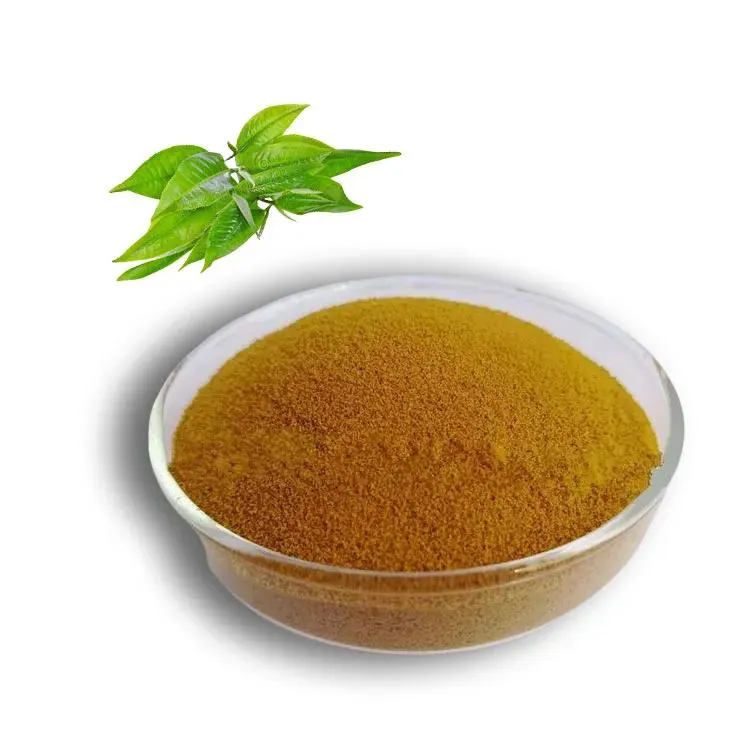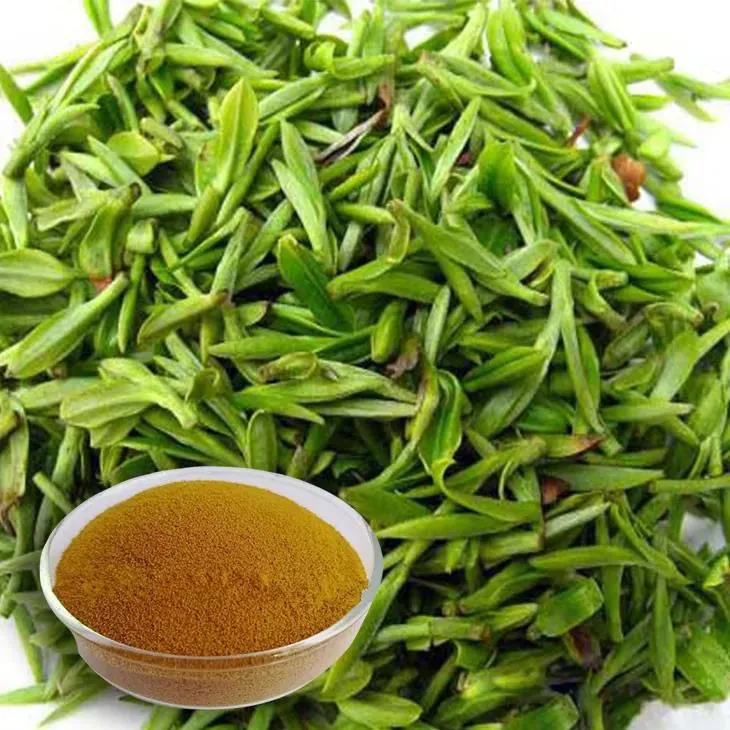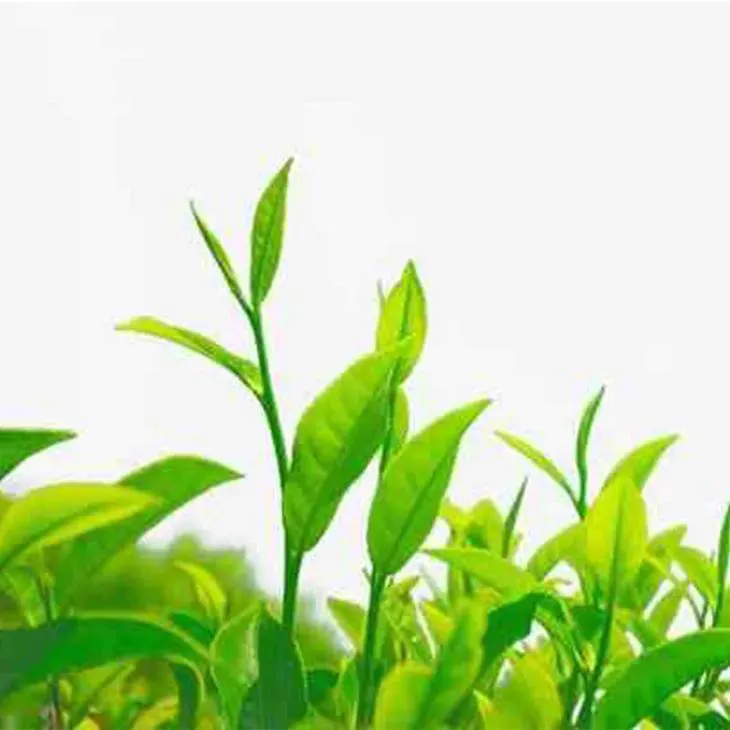- 0086-571-85302990
- sales@greenskybio.com
Active components in green tea extract.
2024-11-28

Introduction
Green tea has been consumed for centuries and is renowned for its numerous health benefits. These benefits are largely attributed to the active ingredients present in Green Tea Extract. The study of these active ingredients has opened up new avenues in medicine, wellness, and the development of functional foods and beverages.

Catechins - The Antioxidant Powerhouse
Catechins, especially EGCG (Epigallocatechin - 3 - gallate), are the most prominent active ingredients in Green Tea Extract. They are part of a larger group of polyphenols.
Antioxidant Activity
One of the most significant properties of catechins is their antioxidant capacity.
- They play a crucial role in antioxidation by scavenging free radicals. Free radicals are highly reactive molecules that can cause damage to cells, proteins, and DNA. Catechins can neutralize these free radicals, thereby reducing the oxidative stress within the body.
- Catechins are effective in inhibiting lipid peroxidation. Lipids in cell membranes are susceptible to peroxidation, which can disrupt the integrity of the cell membrane. By preventing lipid peroxidation, catechins help maintain the normal function of cells.
- The antioxidant activity of catechins protects cells from oxidative damage. This protection is important for various organs and tissues in the body. For example, it can help safeguard the heart, liver, and skin from oxidative stress - related diseases.
Anti - aging Effects
The antioxidant activity of catechins may also be associated with anti - aging effects.
- Oxidative stress is one of the main factors contributing to the aging process. By reducing oxidative stress, catechins can potentially slow down the aging of cells.
- Catechins may also affect the expression of genes related to aging. Some studies suggest that they can regulate genes involved in collagen production and cell renewal, which are important for maintaining youthful skin and overall health.

Caffeine - The Stimulant
Caffeine is another well - known active ingredient in Green Tea Extract.
Energy Boost
Caffeine can increase energy levels.
- It works by blocking the action of adenosine in the brain. Adenosine is a neurotransmitter that promotes relaxation and sleepiness. By blocking adenosine, caffeine stimulates the central nervous system, leading to increased alertness and reduced fatigue.
- Caffeine can also increase the release of fatty acids from adipose tissue. These fatty acids can be used as an energy source, providing an additional boost of energy.
Cognitive Performance Improvement
Caffeine has been shown to improve cognitive performance.
- It can enhance attention and concentration. This is beneficial for tasks that require sustained focus, such as studying or working on complex projects.
- Caffeine may also improve memory and reaction time. Studies have found that it can enhance short - term memory and speed up the reaction to various stimuli.

Polyphenols - Potential in Disease Prevention
In addition to catechins, the presence of other polyphenols in green tea extract has been studied for their potential in reducing the risk of chronic diseases.
Cardiovascular Health
- Polyphenols may help in reducing blood pressure. Some mechanisms suggest that they can relax blood vessels, leading to a decrease in blood pressure levels.
- They also have anti - inflammatory properties, which are beneficial for the cardiovascular system. Chronic inflammation is associated with the development of heart diseases, and polyphenols can help reduce this inflammation.
- Polyphenols may improve lipid profiles by reducing LDL (low - density lipoprotein) cholesterol levels and increasing HDL (high - density lipoprotein) cholesterol levels.
Cancer Prevention
- Some studies suggest that polyphenols can inhibit the growth of cancer cells. They may interfere with the cell cycle of cancer cells, preventing their proliferation.
- Polyphenols can also induce apoptosis (programmed cell death) in cancer cells. This is an important mechanism in preventing the spread of cancer.
- However, more research is needed to fully understand the role of polyphenols in cancer prevention and treatment.
Theanine - Stress and Anxiety Relief
Theanine, an amino acid unique to tea plants, is an important active ingredient in green tea extract.
Stress Reduction
- Theanine can cross the blood - brain barrier and has a relaxing effect on the brain. It can increase the levels of certain neurotransmitters, such as gamma - aminobutyric acid (GABA), which is known for its calming effect.
- Studies have shown that theanine can reduce the physiological and psychological responses to stress. For example, it can lower cortisol levels, which are often elevated during stress.
Anxiety Relief
- Theanine may also help in relieving anxiety. It can have a positive impact on mood and mental well - being.
- Unlike some anti - anxiety medications, theanine has relatively few side effects, making it a potentially attractive option for those seeking natural ways to manage anxiety.
Conclusion
The combination of catechins, caffeine, polyphenols, and theanine makes green tea extract a valuable resource. In the field of medicine, it holds potential for the development of new drugs or therapies for various diseases. In wellness, it can be used as a natural supplement to improve overall health. In the development of functional foods and beverages, green tea extract can be added to enhance the nutritional value and health - promoting properties of products.
FAQ:
What are the main active components in green tea extract?
The main active components in green tea extract are catechins (predominantly EGCG), caffeine, polyphenols, and theanine. Catechins play a crucial role in antioxidation. Caffeine is a stimulant. Polyphenols may help reduce the risk of chronic diseases. Theanine can reduce stress and anxiety.
How do catechins in green tea extract contribute to antioxidation?
Catechins in green tea extract contribute to antioxidation by inhibiting lipid peroxidation. This helps protect cells from oxidative damage, and their antioxidant activity may also be associated with anti - aging effects.
What is the role of caffeine in green tea extract?
The role of caffeine in green tea extract is that it is a well - known stimulant. It can increase energy levels and improve cognitive performance.
How do polyphenols in green tea extract relate to health?
Polyphenols in green tea extract, along with catechins, have been studied for their potential in reducing the risk of chronic diseases.
How does theanine in green tea extract reduce stress and anxiety?
Theanine is an amino acid unique to tea plants. While the exact mechanism of how it reduces stress and anxiety is still being studied, it is known to have an effect on reducing stress and anxiety levels.
Related literature
- Antioxidant Activity of Green Tea Catechins in vitro and in vivo"
- "The Role of Caffeine in Green Tea: Beyond Stimulation"
- "Polyphenols in Green Tea and Their Impact on Chronic Disease Prevention"
- "Theanine: A Promising Compound for Stress and Anxiety Management from Green Tea"
- ▶ Hesperidin
- ▶ citrus bioflavonoids
- ▶ plant extract
- ▶ lycopene
- ▶ Diosmin
- ▶ Grape seed extract
- ▶ Sea buckthorn Juice Powder
- ▶ Beetroot powder
- ▶ Hops Extract
- ▶ Artichoke Extract
- ▶ Reishi mushroom extract
- ▶ Astaxanthin
- ▶ Green Tea Extract
- ▶ Curcumin Extract
- ▶ Horse Chestnut Extract
- ▶ Other Problems
- ▶ Boswellia Serrata Extract
- ▶ Resveratrol Extract
- ▶ Marigold Extract
- ▶ Grape Leaf Extract
- ▶ blog3
- ▶ blog4
-
The best coconut water powder on the market.
2024-11-28
-
Organic Non - GMO Orange - Flavored Powder.
2024-11-28
-
Jujube extract of the best quality.
2024-11-28
-
Bulk purchase of silymarin extract.
2024-11-28
-
Acerola Juice Powder
2024-11-28
-
Angelica sinensis extract
2024-11-28
-
Chaste Berry Extract
2024-11-28
-
Sophora Japonica Flower Extract
2024-11-28
-
White Willow Bark Extract
2024-11-28
-
Bayberry Extract
2024-11-28
-
Ivy Extract
2024-11-28
-
Kelp Extract Powder
2024-11-28
-
Mango flavored powder
2024-11-28
-
Shikone Extract
2024-11-28





















